Fact Checkers Have Their Work Cut Out for Them
Shots Protect Haitian Leader After CNN Interview
From July 28:
School Abuse, Slave Revolts, Hushed History:
With Indigenous, We Don’t Know What We Don’t Know
Martin, Gordon Are Front and Center on Harris
Word In Black Newspaper Alliance Backs Harris
Sinclair Anchor Quits Over Right-Wing Bias
Press, Rights Groups Urged Pressure on Netanyahu
Black Radio Split on Use of Campaign Questions
Short Takes: William C. Rhoden and Marc J. Spears on the Olympics; overturning Florida anti-DEI law; Carl-Philippe Juste and resilience of Miami’s Little Haiti; lack of progress since choking of Eric Garner; Marshall Project’s “Investigate This!”
Frances Robles; David Gonzalez; Dudley Brooks; Mary Mason; “disappearance” of Nicaragua journalist; webinar on press-freedom challenges in Ecuador; Guatemala’s Jose Rubén Zamora.
This Thursday: ‘Press Freedom in Black-Run Countries’
New! Facebook fundraiser for Journal-isms Inc.
Donations are tax-deductible.

Fact Checkers Have Their Work Cut Out for Them
Donald J. Trump has agreed to address the National Association of Black Journalists convention in Chicago on Wednesday, NABJ announced late Monday, becoming the first GOP presidential candidate to accept such an invitation since incumbent George W. Bush spoke before the now-defunct Unity: Journalists of Color coalition in 2004. However, Trump’s appearance presents a fact-checking challenge for interviewers of a candidate whose lies have become routine.
“Fellow presidential candidate Vice President Kamala Harris was also invited to participate in this year’s convention; her confirmation is pending,” NABJ said.
“Trump will engage in a Q&A with political journalists before an audience of registered convention attendees that will concentrate on the most pressing issues facing the Black community.
“The event will be moderated by Rachel Scott, senior congressional correspondent for ABC News; Harris Faulkner, anchor of The Faulkner Focus and co-host of Outnumbered on FOX News; and Kadia Goba, politics reporter at Semafor.”
NABJ said the event would not be open to the general public but would be streamed via NABJ’s YouTube and Facebook pages.
The forum will be the first to attract a major newsmaker to one of the summer’s journalists-of-color conventions. None spoke at the National Association of Hispanic Journalists convention in Hollywood, Calif., or the Indigenous Journalists Association conference in Oklahoma City, and none is scheduled for the Asian American Journalists Association in Austin, Texas.
However, for security reasons, presidential candidates normally do not announce their plans until the last minute.
The Chicago conference was originally to be a joint one between NABJ and NAHJ, with the potential appearance of a presidential candidate one of the benefits. But NAHJ pulled out, citing a desire to commemorate its 40th anniversary separately.
The choice of Fox News’ Faulkner and the idea of giving Trump such a platform were among the topics raised on social media after NABJ’s announcement.
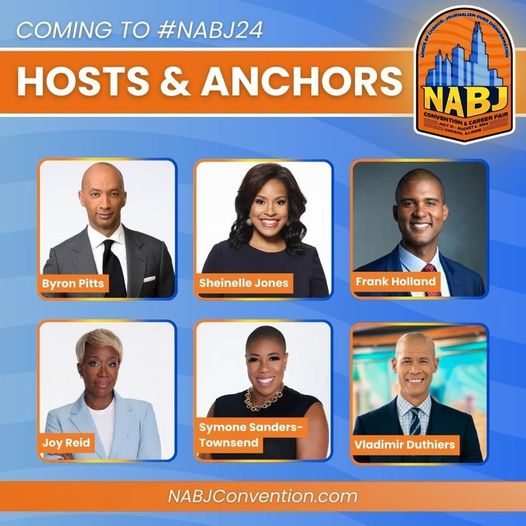
Attendance in Chicago could surpass the record 4,105 at the 2019 convention in Miami.
On X, veteran White House correspondent April Ryan and others questioned the choice of Faulkner — who this year said of the Biden administration, “If you knowingly let criminals into the country, does that even go beyond impeachment? I mean, if you are allowing the enemy to harm us, that sounds like treason.” Others said NABJ was giving Trump a forum to spread disinformation.
Some pointed to NABJ’s own past statements about Trump’s disrespect of the press while president.
However, Jemele Hill, NABJ “Journalist of the Year” in 2018, wrote, “As journalists, we can never be afraid to tackle someone like Trump. The reality is that he is running for president and needs to be treated as such. Being questioned by journalists is part of the job, and especially important in the company of Black journalists. Mainstream media keeps trying to convince us that he actually is gaining support among Black people. Let’s see if it’s true.”
The Trump campaign used the NABJ announcement to assert that “President Trump accomplished more for Black Americans than any other president in recent history by implementing America First policies on the economy, immigration, energy, law and order, and foreign policy.“
It said in a news release, “Historic rates of Black voters now support President Trump, and the reason is simple: Black voters know that President Trump is the only presidential candidate who can deliver results on day one because he already has, including landmark unemployment rates for Black Americans, increased median income for Black households, historic permanent funding for HBCUs (Historically Black Colleges and Universities), comprehensive bipartisan criminal justice reform, and nearly $50 billion in funds to revitalize Opportunity Zones,” his campaign continued.
Such claims have been debunked.
“Trump says he’s long worked ‘hand in hand’ with Black people. Let’s review,” Glenn Kessler wrote in February for The Washington Post.
“During his presidency, Trump often claimed he had done more for Black Americans than any other president — or, he sometimes might concede, since Abraham Lincoln. Historians scorned his claim. Many cited Lyndon B. Johnson, who signed into law the Civil Rights Act of 1964 and the Voting Rights Act of 1965. It was Johnson, the historians said, who after Lincoln was the president who made the most lasting impact on the lives of African Americans.
“To make his case, Trump would cite achievements like a low Black unemployment rate, increased funding for historically Black colleges and universities (a congressional initiative, not an executive branch one) or passage of an opportunity zone program.
“’ Trump’s so-called accomplishments will not even be noticed by historians five years from now,’ said H.W. Brands, historian at the University of Texas at Austin, in 2020. . . .”

The Philadelphia Tribune compared the number of African Americans in Donald Trump’s cabinet, top, with that of President Biden’s, bottom. (Credit: Adam Shultz/White House)
Kessler continued, “ ‘We achieved the lowest African American unemployment rate ever recorded,’ Trump declared, apparently unaware that Black unemployment under [President] Biden has fallen even further. According to the Bureau of Labor Statistics, the unemployment rate under Trump hit a low of 5.3 percent in August 2019, but had inched up to 6.1 percent before the pandemic struck in March 2020. Under Biden, the Black unemployment rate dipped to as low as 4.8 percent in April 2023; it was 5.3 percent in January.
“But rather than fact-check Trump’s golden-oldie material — or his assertion, without evidence, that Biden is a ‘racist’ — Trump’s reference to his career as a real estate builder who supported Black people prompted us to take a walk down memory lane. Trump’s troubled history with Black people was covered when he first ran for president in 2016, but it’s time for a refresher course now that he is seeking the presidency again. . . . “
More recently, Factcheck.org wrote Friday, “Contrary to claims by Trump and other Republicans, violent crime has gone down during Biden’s term. That’s according to crime data compiled by the FBI and other sources.”
Marco Cerino wrote July 9 for the Philadelphia Tribune, “Despite having 62 different names in appointed or acting roles, Trump only included one Black person in his administration at that level — Dr. Ben Carson served as secretary of Housing and Urban Development, or HUD.”
As Lynn Sweet and Emmanuel Camarillo reported for Chicago Public Media, “The convention runs from Wednesday through Sunday at the Hilton Chicago, 720 S. Michigan Ave., and will host thousands in the industry for workshops, speaking events, forum discussions, career advancement opportunities and more.
“Ken Lemon, NABJ president and a reporter at WSOC-TV in Charlotte, North Carolina, said attendance numbers are tracking ahead of previous conventions and could end up surpassing the record 4,105 that attended the 2019 convention in Miami,” NABJ’s largest ever.
At Monday’s board of directors meeting, Executive Director Drew Berry said 3,967 people had registered for the conference, and “we haven’t even started the convention yet.” He also said that as of two weeks ago, NABJ had 4,357 members.
- Joey Cappelletti, Associated Press: Harris quickly pivots to convincing Arab American voters of her leadership
- Brooks Jackson, Eugene Kiely, D’Angelo Gore, Lori Robertson and Robert Farley, FactCheck.org: FactCheck updates how the US has performed under Biden — Multiple yardsticks measure what has changed since Trump left office
- Steven Rattner, New York Times: Don’t Take Trump’s Word for It. Check the Data.
- Max Tani, Semafor: A more media-friendly Kamala Harris runs for president
- Michael Scherer, Washington Post: Trump campaign attacks Kamala Harris in a new immigration-focused ad
- Michael Scherer and Tyler Pager, Washington Post: How Kamala Harris took control of the Democratic Party
Exiled Haitian journalist Roberson Alphonse and Garry Pierre-Pierre, publisher of the Haitian Times in Brooklyn, N.Y., will be part of a Journal-isms Roundtable on “Press Freedom in Black-Run Countries” Thursday at the offices of Chicago Public Media. Those interested may join via Zoom or in person. See: https://www.journal-isms.com/journal-isms-roundtable/ and the end of this column. Alphonse, to be honored by the National Association of Black Journalists with its Percy Qoboza Award to a foreign journalist, speaks here with prior Qoboza winner Wesley Gibbings last year about his Guillermo Cano Press Freedom Prize. (Credit: YouTube).
Shots Protect Haitian Leader After CNN Interview
“Security forces protecting Haiti’s leader provided covering fire as he left a hospital in Port-au-Prince after an interview with CNN, in a stark illustration of the violence that continues to plague the gang-ravaged nation,” Larry Madowo, Caitlin Stephen Hu and Jessie Yeung reported Monday for CNN.
“CNN had been interviewing interim Prime Minister Garry Conille at a hospital destroyed by gangs when repeated and long volleys of gunfire could be heard in a nearby neighborhood. Conille initially proceeded with the interview and did not remark on the gunfire — which is not an unusual thing to hear in Port-au-Prince.
“After the interview, officials and the CNN team were driven away in cars, with a few more shots ringing out at they pulled onto the main road.
“According to a statement from the Haitian National Police and the Multinational Security Support (MSS), a Kenyan-led security force, those final shots were troops firing their weapons as the prime minister was leaving to ‘provide cover.’
“Afterward, the national police and MSS Force “followed up where the shots had been fired from the neighborhood and pacified the area,” it said.
“No one was injured and the prime minister was safely returned to his office.
“Haiti is still roiling from deadly gang violence and political upheaval, which sharply escalated in February. The crisis saw critical infrastructure attacked by gangs and cease to function, including the capital’s international airport and seaport, breaking vital supply lines of food and aid. . . .”
School Abuse, Slave Revolts, Hushed History
July 28, 2024
With Indigenous, We Don’t Know What We Don’t Know
Martin, Gordon Are Front and Center on Harris
Word In Black Newspaper Alliance Backs Harris
Sinclair Anchor Quits Over Right-Wing Bias
Press, Rights Groups Urged Pressure on Netanyahu
Black Radio Split on Use of Campaign Questions
Short Takes: William C. Rhoden and Marc J. Spears on the Olympics; overturning Florida anti-DEI law; Carl-Philippe Juste and resilience of Miami’s Little Haiti; lack of progress since choking of Eric Garner; Marshall Project’s “Investigate This!”
Frances Robles; David Gonzalez; Dudley Brooks; Mary Mason; “disappearance” of Nicaragua journalist; webinar on press-freedom challenges in Ecuador; Guatemala’s Jose Rubén Zamora.
This Thursday: ‘Press Freedom in Black-Run Countries’
New! Facebook fundraiser for Journal-isms Inc.
Donations are tax-deductible.
Says a promotional blurb for the trailer: “Set amidst a groundbreaking investigation, SUGARCANE illuminates the beauty of a community breaking cycles of intergenerational trauma and finding the strength to persevere.”
With Indigenous, We Don’t Know What We Don’t Know
At one point in the new movie “Sugarcane,” an Indigenous father reveals to his inquisitive filmmaker son, “My mother was abused by a priest and that’s how I was born.”
Filmed in Canada and made by two journalists who met at HuffPost — one Native, the other from a family of Holocaust survivors — the documentary makes personal the news stories about the trauma, even death, visited upon children forced to attend boarding schools to assimilate them into the majority culture. The trauma continues into succeeding generations.
“Sugarcane” goes into wider circulation in August. It was screened Thursday at the Indigenous Media Conference of the Indigenous Journalists Association, held in Oklahoma City and ending Saturday night with an awards program that included the Osage Singers, celebrated for their drumming prowess in the film “Killers of the Flower Moon.”
 The association also elected board members, who in turn re-elected as president Christine Trudeau (pictured) of the Prairie Band Potawatomi Nation, who is an independent investigative journalist and editor. The group announced Albuquerque, N.M., as the site of the 2025 convention.
The association also elected board members, who in turn re-elected as president Christine Trudeau (pictured) of the Prairie Band Potawatomi Nation, who is an independent investigative journalist and editor. The group announced Albuquerque, N.M., as the site of the 2025 convention.
The conference was a reminder to outsiders that we don’t know what we don’t know.
“In this Cherokee Almanac,,” says Osiyo TV, “we explore how many aspects of American life were adopted by some Cherokees who viewed assimilation as the best survival tactic against American expansion. One such adoption was the practice of chattel slavery. We look back on an uncomfortable part of Cherokee history, the Cherokee Slave Revolt of 1842.” (Credit: YouTube)
Another conversation at the gathering went back more than a century, to 1842 and the Cherokee Nation.
“On the morning of November 15 more than twenty-five slaves, mostly from the Joseph Vann plantation, revolted,” according to the Encyclopedia of Oklahoma History and Culture. “They locked their masters and overseers in their homes and cabins while they slept. The slaves stole guns, horses, mules, ammunition, food, and supplies. At daybreak the group, which included men, women, and children, headed toward Mexico, where slavery was illegal.
“In the Creek Nation the Cherokee slaves were joined by Creek slaves, bringing the group total to more than thirty-five. The fugitives fought off and killed a couple of slave hunters in the Choctaw Nation. . . .”
It was the largest slave revolt west of the Mississippi, according to genealogist Angela Y. Walton-Raji, who spoke to the conference remotely, yet the revolt is not widely known. It is part of the sometimes-fraught joint history of two oppressed groups, African Americans and Native Americans.
As a journalism conference, issues of press freedom were of necessity a part, along with nuts-and-bolts training in the craft as well as topics specific to Indigenous people, such as how voting restrictions affect reservation dwellers.
The conference, attended by 402 registrants (up from 304 last year), presented another showing of 2023’s “Bad Press,” about a years-long fight in the Muscogee Nation to restore and codify free press protections. The struggle culminated in a landmark achievement in the fall of 2021, when the tribal nation’s citizens voted overwhelmingly to approve a free press constitutional amendment,” as Marina Fang wrote last November in HuffPost.
What is less well known is that of the 574 federally recognized Native tribes, just five have free press laws on the books. The Muscogee Nation is the only one with the right to a free and independent press enshrined in its tribal constitution.
Mark Randolph, a member of the Muscogee (Creek Nation) National Council who appears in the film, told the screening audience, gathered Thursday at the First Americans Museum in Oklahoma City, “Education is very important. A lot of people don’t know what freedom of the press is; why it is so important.
“Whoever controls the media controls the mind,” Randolph added, noting that he did not originate that maxim.
Journalist Angel Ellis, Muscogee Creek, a major figure in the documentary who was re-elected to IJA’s board, told the group, “We’re trying to revive ‘Schoolhouse Rock,’ ” programs of animated shorts starting in the 1970s that illustrate educational subjects such as history, science, multiplication tables and basic grammar.
“We don’t really understand the role a free press plays” in our democracy. Ellis also said, “People are excited to come work for Mvskoke Media now after seeing the film.”
The conference was the first since the Native American Journalists Association voted at its 2023 convention to change its name to the Indigenous Journalists Association.
Francine Compton, a former NAJA president and the associate director of IJA, said then that the move was made to match international language and to ensure that all Indigenous storytellers feel welcomed.
The organization had already made moves in that direction. The group participated at the 22nd Session of United Nations Permanent Forum on Indigenous Issues, and a Saturday session in Oklahoma City, “The Power and Promise of Global Indigenous Collaborations,” featured panelists from New Zealand, Australia and Canada and Hawaii.
As illustrated at the awards ceremony, the border between Canada and the United States, known by some as the “Medicine Line,” was never as distinct among Indigenous people. Tribal nations straddled the demarcation.
The 2024 Tim Giago Free Press Award went to Brandi Morin (Cree /Iroquois/French), “for her reporting on police actions and coverage of the removal of a homeless encampment for Ricochet Media on Jan. 10 in Edmonton, Canada. Despite being a credentialed journalist, Morin was arrested for doing her job and documenting the experience of Indigenous people living in the encampment.”
 Morin spoke at length Saturday night, along with Mary Hudetz (pictured) of ProPublica, who received the Richard LaCourse Award for Investigative Journalism “for her work with ProPublica’s “The Repatriation Project – The Delayed Return of Native Remains.“
Morin spoke at length Saturday night, along with Mary Hudetz (pictured) of ProPublica, who received the Richard LaCourse Award for Investigative Journalism “for her work with ProPublica’s “The Repatriation Project – The Delayed Return of Native Remains.“
“The project highlights how museums and universities have actively fought against repatriating Native American remains and sacred objects plundered over centuries. As a result of this reporting, American museums and universities repatriated more remains and objects to tribal nations in 2023 than any year in the three decades since NAGPRA’s passage,” IJA said, referring to the Native American Graves Protection and Repatriation Act.
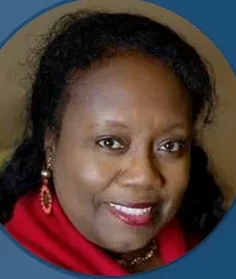 Genealogist Walton-Raji (pictured), based in Fort Smith, Ark., raised the example of the 1842 slave revolt case at a workshop called “Oklahoma Freedmen and McGirt,” a reference to a tribal sovereignty case, McGirt v. Oklahoma, that bore on the rights of Black members of the various tribes.
Genealogist Walton-Raji (pictured), based in Fort Smith, Ark., raised the example of the 1842 slave revolt case at a workshop called “Oklahoma Freedmen and McGirt,” a reference to a tribal sovereignty case, McGirt v. Oklahoma, that bore on the rights of Black members of the various tribes.
That slave revolt ultimately was unsuccessful.
“The Cherokee Nation sent the Cherokee Militia, under Capt. John Drew, with eighty-seven men to catch the runaways,” reports the Encyclopedia of Oklahoma History and Culture. “This expedition was authorized by the Cherokee National Council in Tahlequah on November 17, 1842. The militia caught up with the slaves seven miles north of the Red River on November 28, 1842. The tired, famished fugitives offered no resistance.
“The party returned to Tahlequah on December 8, 1842. Five slaves were executed, and Joseph Vann put the majority of his rebellious slaves to work on his steamboats, which worked the Arkansas, Mississippi, and Ohio Rivers. The Cherokees blamed the incident on free, armed black Seminoles who lived in close proximity to the Cherokee slaves at Fort Gibson. On December 2, 1842, the Cherokee Nation passed a law commanding all free African Americans, except former Cherokee slaves, to leave the nation.”
The role of Black people among Native tribes is “sort of like the big elephant in the room,” Walton-Raji said in response to a question about how much of this history is taught in schools, including in Oklahoma, home to 39 tribes.
“Not just about slavery, about anti-Black sentiment.” Walton-Raji’s remarks will be part of a podcast, said the presenters, Allison Hererra, Xolon Salinan, and Adreanna Rodriguez, Standing Rock.
A more contemporary example of Black-Indigenous relations involved the case of Michael J. Hill. As Chris Cameron and Mark Walker explained a year ago for The New York Times:
“Early one morning in September 2020, Michael J. Hill called the police after hearing banging on the doors and windows of his home in Okmulgee, Okla. — part of a swath of the state that the Supreme Court had recently ruled to be tribal land.
“He eventually realized it was a group of his friends, Mr. Hill later recalled in an interview, but the police had arrived and proceeded to arrest one of them, Aaron R. Wilson, for an outstanding warrant. Mr. Hill, 40, then got into an altercation with the police and was himself arrested after a struggle.
“Mr. Hill and Mr. Wilson are both Black and citizens of Native American tribes in Oklahoma. They both moved to have their cases dismissed, arguing that as tribal members in tribal territory, they were outside the state’s criminal jurisdiction. Mr. Wilson’s case was dismissed, but Mr. Hill’s request was denied.
“The key difference in the fate of the two men was race — specifically, a small degree of what is known in the courts as ‘Indian blood.’ Mr. Wilson is one sixty-fourth Creek Indian. Mr. Hill is a citizen of the Cherokee Nation through ancestors called Freedmen — Black people who were enslaved by Native tribes. Because Mr. Hill’s ancestors did not have Indian blood, he was found in court not to be Indian. . . .”
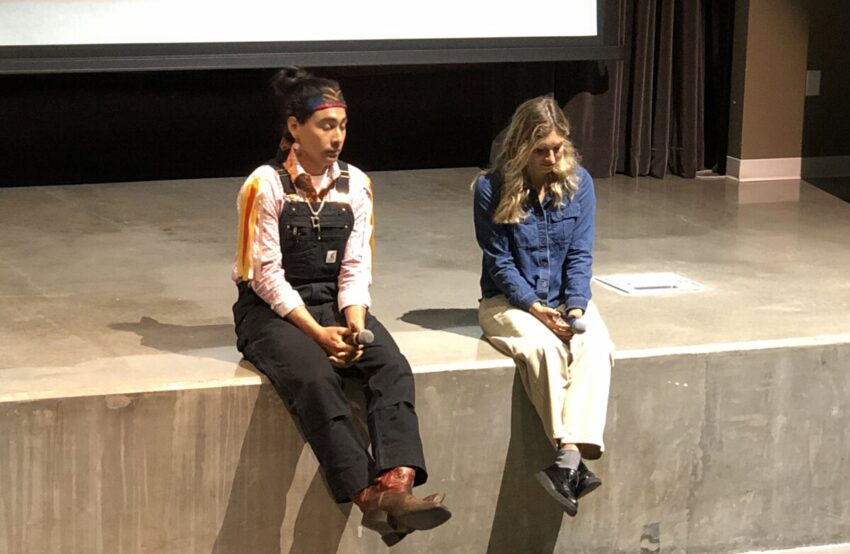
Julian Brave NoiseCat and Emily Kassie take questions after a screening Thursday at Oklahoma’s First Americans Museum. (Credit: Richard Prince)
Julian Brave Noisecat, the co-director of “Sugarcane” who had been a Native issues fellow at HuffPost when the idea for his project germinated, appeared with his filming partner Emily Kassie, the co-director and producer who has also worked at the Marshall Project, which reports on criminal justice issues.
Speaking to the IJA audience at Oklahoma’s First Americans Museum, they said that a bill for a Truth and Healing Commission on Indian Boarding School Policies would be going to the U.S. Senate floor, and that many of those affected would like “some kind of reparations.”
Writing of the festival prizes the film has won, Christian Blauvelt wrote for IndieWire July 10, “it’s a really hard film to watch in a lot of ways. It’s very much about abuse and trauma and the extraordinary ripple effects of that across generations and across an entire community and nation. But I think that the way it combines that history with really intimate moments is poetic and really beautiful and something that needs to be celebrated, and I can’t wait to see what happens as more people see get to see this film.”
The documentary opens Aug. 9 in New York and in the Canadian cities of Ottawa, Saskatoon and Toronto.
-
- Tristan Ahtone, Grist: Grist and the AP lead convening to expand Indigenous reporting collaboration
-
- Russell Contreras, Axios: Cherokee Nation wants federal law fix for Black tribal citizens (March 31)
-
- Pauly Denetclaw, ICT: Vice President Kamala Harris’ mixed record on Indigenous issues
-
- John Locher and Melina Walling, Associated Press: AP journalists highlight climate change threat to Indigenous traditions in comprehensive, empathetic coverage (July 19)
“Join me tonight immediately following President Biden’s address to the nation,” Ed Gordon wrote Wednesday on Facebook. “Swipe for details. Be a part of the conversation and get ready for next steps. This election is critical. Don’t sit [it] out.” (Credit: Facebook)
Martin, Gordon Are Front and Center on Harris
Black journalists Roland Martin and Ed Gordon were front and center as Vice President Kamala Harris began her first week as the presumptive Democratic Party nominee for president, raising millions in the campaign’s inaugural days.
“It started Sunday, when Win With Black Women hosted a Zoom call that the group said attracted 44,000 attendees and raised more than $1.5 million,” Ja’han Jones wrote Friday for MSNBC. “The next day, a group of Black men under a similar banner, Win With Black Men, hosted a call that an organizer said attracted nearly 54,000 attendees and raised $1.3 million.
“Several more virtual meetups have followed.
“A Latinas for Harris call on Wednesday reportedly attracted 5,000 attendees and raised $110,000. The same night, a call hosted by South Asian Women for Harris drew 10,000 attendees and raised $285,000, according to an organizer. The latest whopping fundraising haul came Thursday night during a Zoom call intended for white women who support Harris, which an organizer said drew 164,000 participants and raised $2 million. (NBC News hasn’t confirmed these fundraising numbers independently.)
“And the trend continues. A call was held Thursday for Black gay and queer men supporting Harris, and a similar call was organized for white men. And a national, coalition-wide Women for Harris call has been scheduled for Monday.
“What a difference a week makes.”
Separate from these fundraising events, Gordon co-hosted a “Town Hall” from the NAACP Wednesday to “discuss the role and importance of Black voters in the upcoming election.” It immediately followed President Biden’s speech to the nation on why he was stepping away from the presidential nomination and endorsing Harris.
“We cannot be distracted,” the NAACP said. “Ahead of November, we must remain all in on educating, engaging and mobilizing Black America. All in on fighting for policies that will advance, not undermine our progress. We must remain all in on our community, standing as a powerful front as we head to the ballot box to defend democracy.”
Speakers included Derrick Johnson, president and CEO, NAACP; Rep. Jasmine Crockett, D-Texas, and Wes Bellamy, EdD, public policy chairman of 100 Black Men of America, among others.
Roland Martin reports for his Black Star Network, “Call For White Women To SUPPORT Kamala Harris: Whiteness Won’t Save You From Trumpism.” (Credit: YouTube)
“On Monday night, following Sunday’s historic call and fundraising effort with Black women, over 20,000 Black men joined the ‘Win with Black Men’ meeting” hosted and streamed by journalist Roland Martin and his Black Star Network “in support of Harris’ historic campaign,” Rayna Reid Rayford reported Wednesday for Essence.
“After the call, Martin posted on X, “I have no words. And not just because I’m tired. My @BlkStarNetwork just told me that 53,862 people registered for our #WinWithBlackMen video call. We raised $1.3M and counting from 17,000 donors.”
According to Martin, the money fundraised “will go to the Harris campaign, as well as to grassroots organizations run by Black men in battleground states.”
The call was organized by Quentin James, co-founder of The Collective PAC, political and legal strategist Bakari Sellers, Khalil Thompson of Win With Black Men, and Michael Blake of Kairos Democracy Project, Gerren Keith Gaynor wrote Tuesday for TheGrio.
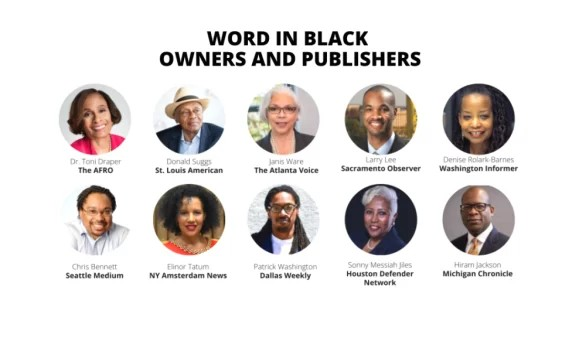
Word In Black Newspaper Alliance Backs Harris
Word in Black, a three-year-old online news collaboration of 10 of the most well-known Black newspapers in America, “wholeheartedly, and without question endorse Vice President Kamala Harris for the next president of the United States,” the group announced Friday.
“At this pivotal moment in American history, Harris represents the change we want to see now. She is a transformational figure, poised to make history not only as the first woman to serve the nation as commander in chief but as the first Black woman, first HBCU graduate, and first member of a Black Greek letter organization to hold the most powerful job on earth.
“It is our first-ever political endorsement, and we make it without reservation. . . .
“For us at Word in Black, the choice for president is as obvious as it is historic. The Republican nominee represents an America that will return to its ugly, violent, racist past, a time when we were treated like second-class citizens and our communities were under constant threat. Harris represents a new generation of leadership, a future built on optimism, inclusion, and continued progress toward a more perfect union. . . . “
-
- Zeeshan Aleem, MSNBC: Kamala Harris sounds different, but she could still be a status quo president on Israel
-
- Jenice Armstrong, Jennifer Stefano and Helen Ubiñas, Philadelphia Inquirer: ‘Absurd argument’: Three columnists react as comments about Kamala Harris’ childless status go viral
-
- Perry Bacon Jr., Washington Post: ‘I do think she can win!’ Impromptu thoughts on Harris doubters.
-
- Jennifer Bendery, HuffPost: The Mechanics — And Messaging — Behind Switching Out Joe Biden For Kamala Harris
-
- Charles M. Blow, New York Times: Democrats, All of Them, Must Protect Harris
-
- Ronald Brownstein, the Atlantic: Can Harris Reassemble Obama’s Coalition?
-
- Christina Carrega and Madeline Thigpen, Capital B: Kamala Harris’ ‘Top Cop’ Legacy Is Complicated
-
- Tommy Christopher, Mediaite: CNN Crew Cracks Up At ‘White Women For Kamala’ Alternative Nickname — ‘Karens For Kamala’
-
- Cary Clack, San Antonio Express-News: Kamala Harris is a qualified presidential candidate, not a ‘DEI hire’
-
- Hillary Rodham Clinton, New York Times: How Kamala Harris Can Win and Make History
-
- Jelani Cobb, New Yorker: Kamala Harris Isn’t Going Back
-
- Isabela Dias, Mother Jones: The Myth of Kamala Harris as “Border Czar”
-
- Marina Fang, HuffPost: Kamala Harris Is Giving Us Snark — And It’s The Energy We’ve Been Waiting For
-
- Fernanda Figueroa, Associated Press: What Usha Vance’s rise to prominence means to other South Asian and Hindu Americans (July 19)
-
- Jennifer Gerson, The 19th: The night White women raised millions for Harris. And broke Zoom.
-
- Elaine Godfrey, The Atlantic: Kamala Harris’s White Boy Summer
-
- Renée Graham, Boston Globe: Republicans scramble to define Kamala Harris with old stereotypes and conspiracy theories
-
- LZ Granderson, Los Angeles Times: Biden’s decision to drop out is one of the most patriotic moments in a long life of service
-
- LZ Granderson, Los Angeles Times: As president, Harris would be a ‘first’ in so many ways. She can handle it
-
- Max Greenwood, Miami Herald: Kamala Harris comes out of the starting gate with a problem with Hispanic voters
-
- Errin Haines and Jennifer Gerson, the 19th: Four hours, 44,000 Black women and one Zoom call
-
- Eric Hananoki, Media Matters for America: On podcast for Project 2025 partner, JD Vance attacked journalists for being “miserable and unhappy” because their biological clocks have run out
-
- Michael Harriot, theGrio: The ‘Kamala ain’t Black’ conspiracy theory explained
-
- Roy S. Johnson, al.com: Republicans be careful in Kamala Harris attacks; your daughters are watching
-
- Ankush Khardori, Politico Magazine: ‘Kamala the Cop’ Doesn’t Sound So Bad in 2024
-
- Jamiles Lartey and Lakeidra Chavis, Marshall Project: 5 Things to Know About Kamala Harris’ Criminal Justice Record
-
- Ruben Navarrette Jr., syndicated: So much for civility: Harris vs. Trump will be as ugly as it gets
-
- Jeremy W. Peters, Audra D. S. Burch and Clyde McGrady, New York Times: Black Voters Feel Excited, and Worried, about a Kamala Harris Campaign
-
- William C. Rhoden, Andscape: Stephen Curry, Kamala Harris and the reentry of political activism into the stadium
-
- Eugene Robinson, Washington Post: Yes, Biden earned a second term. He’s also right to step down.
-
- Sarah Rumpf, Mediaite: Is The New York Post Going to Retract Flimsy Obama Piece Now That He’s Endorsed Harris?
-
- Darren Sands, Associated Press: Kamala Harris: A Baptist with a Jewish husband and a faith that traces back to MLK and Gandhi
-
- A.R. Shaw, New Pittsburgh Courier: Thousands Of Black men raise over $1 million for Kamala Harris on ‘Win With Black Men’ call
-
- Ivana Saric, Axios: Harris campaign energizes dispirited Black and Asian American voters
-
- Brent Staples, New York Times: Biden Should Have Treated Harris as a Future President
-
- Kimberly Atkins Stohr, Boston Globe: Real Democratic unity requires more than words
-
- Ernie Suggs, Atlanta Journal-Constitution: ‘Rocking with Kamala Harris’: Thousands of Black men rally, raise money on video call
-
- Terry Tang, Associated Press: Kamala Harris has America focused on multiracial identity
-
- Sakshi Venkatraman and Kimmy Yam, NBC News: Biden was losing Asian American voters. Will they support Harris?
-
- Bob Wekesa and Asad el Malik, African Centre for the Study of the United States at the University of the Witwatersrand, South Africa: Biden’s resignation, Harris’ Chance: Implications for Africa.
-
- Stereo Williams, Daily Beast: Kamala Harris Has a Fight to Win — and Black America Must Support Her
-
- Brittany Wong, HuffPost: For Black Women, Kamala Harris’ Historic Run Brings Excitement Mixed With Racism Concerns
-
- Curtis M. Wong, HuffPost: Beyoncé Gives Kamala Harris Permission To Use Her Song On The Campaign Trail
Sinclair Anchor Quits Over Right-Wing Bias
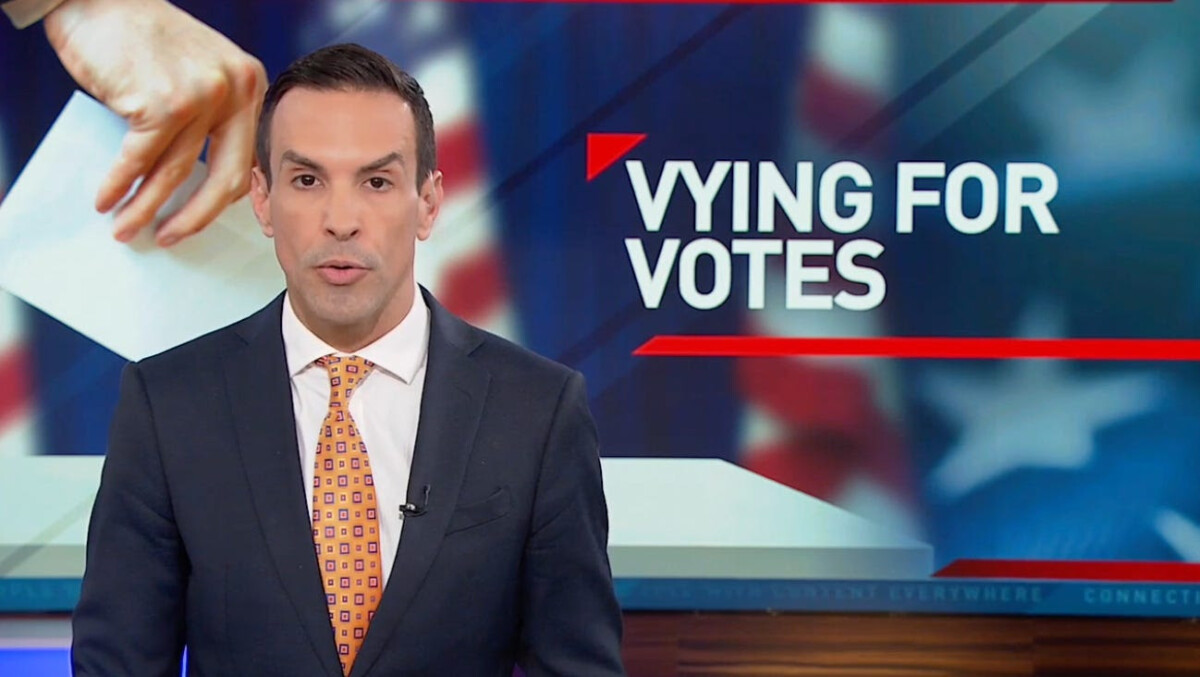 “Eugene Ramirez (pictured), the lead anchor of Sinclair’s national evening news broadcast, resigned in January over concerns about the accuracy and right-wing bias of the content he was required to present on air, three sources told Popular Information,” Judd Legum and Rebecca Crosby reported Tuesday for the newsletter, which says it is “dedicated to accountability journalism.”
“Eugene Ramirez (pictured), the lead anchor of Sinclair’s national evening news broadcast, resigned in January over concerns about the accuracy and right-wing bias of the content he was required to present on air, three sources told Popular Information,” Judd Legum and Rebecca Crosby reported Tuesday for the newsletter, which says it is “dedicated to accountability journalism.”
“The sources — one current and two former Sinclair employees — spoke to Popular Information on the condition of anonymity, citing concerns about the potential professional repercussions of speaking out about Sinclair’s editorial processes. Ramirez’s show, which continues to air with a new host, appears on at least 70 of the hundreds of local television affiliates owned by Sinclair.”
Ramirez confirmed the information later Tuesday on X, writing, “This morning I was sent a news story about me. I can only say that I do not contest any of the claims made, and I appreciate the messages of support I have received in response.
“My integrity is not for sale.
“Now, let’s get to work.”
The Popular Information story continued, “One of the primary issues that prompted Ramirez’s resignation was the requirement to include at least three stories produced by Sinclair’s Rapid Response Team (RRT) on a nightly basis. Sinclair’s RRT is a group of four reporters who work out of Sinclair’s national headquarters in Maryland. The group’s output is prodigious. A Popular Information review found that between January 1 and July 4 this year, the RRT published at least 775 stories.
“Most of the RRT’s stories are short and aggregate information from other sources. Sinclair publicly claims that the RRT and other components of its national newsgathering operation, known as The National Desk, provide a “comprehensive, commentary-free look of the most impactful news of the day.” But a look at the RRT’s stories over the course of the year shows that the group frequently produces pieces that have more in common with right-wing agitprop than journalism. . . .”
-
- Josh Fiallo, Daily Beast: Top Sinclair Anchor Confirms He Quit Over Station’s ‘Right-Wing Propaganda’
“Nine months into the war in Gaza, journalists … continue to pay an astonishing toll,” CEO Jodie Ginsberg of the Committee to Protect Journalists said in a video message to the Israeli prime minister. “More than 100 journalists have been killed. An unprecedented number of journalists and media workers have been arrested, often without charge. They have been mistreated and tortured.” (Credit: YouTube)
Press, Rights Groups Urged Pressure on Netanyahu
There is no indication that their pleas were heeded, but 10 human rights and press freedom organizations urged President Joe Biden to press Israeli Prime Minister Benjamin Netanyahu on the unprecedented number of journalists killed in the Gaza Strip and the near-total ban on international media entering the Strip.
Netanyahu met with Biden at the White House on Thursday.
The letters, sent to the White House and U.S. congressional leaders, were signed by the Committee to Protect Journalists, Amnesty International USA, Freedom of the Press Foundation, Knight First Amendment Institute, the National Press Club, PEN America, Reporters Without Borders, the Tahrir Institute for Middle East Policy, the Association of Foreign Press Correspondents USA, and the Coalition for Women in Journalism.
“The letters call on the United States, Israel’s chief ally, to ‘ensure that Israel ceases the killing of journalists, allows immediate and independent media access to the occupied Gaza Strip, and takes urgent steps to enable the press to report freely throughout Israel and the Occupied Palestinian Territories,’ while outlining a series of grave press freedom violations and a response of utter impunity,” CPJ reported.
Since the start of the Israel-Gaza war last October, the letter said, the Netanyahu government’s actions have created what amounts to a “censorship regime.”
-
- Steve Holland and Jeff Mason, Reuters: Harris pushes Netanyahu to ease suffering in Gaza: ‘I will not be silent’
Black Radio Split on Use of Campaign Questions
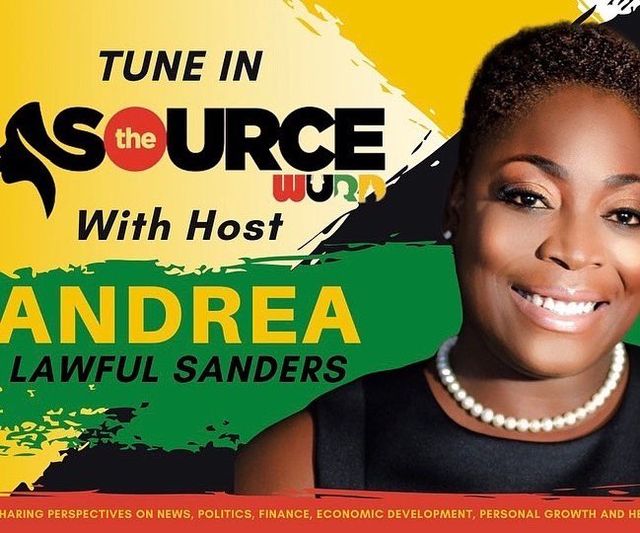 The controversy over a Philadelphia talk show host’s departure after acknowledging she had interviewed President Joe Biden using questions that had been provided by his campaign “was a deeply painful moment for WURD — and many others in Black talk radio,” Josh Hersh wrote Thursday for Columbia Journalism Review.
The controversy over a Philadelphia talk show host’s departure after acknowledging she had interviewed President Joe Biden using questions that had been provided by his campaign “was a deeply painful moment for WURD — and many others in Black talk radio,” Josh Hersh wrote Thursday for Columbia Journalism Review.
“A review by the New York Times revealed that half a dozen Black radio hosts had interviewed Biden over the course of 2024 using variants of the same questions: what were some of his accomplishments, what would he say to people who didn’t think their vote mattered, what’s at stake in the election for Black voters. (The campaign acknowledged distributing the questions, but insisted to reporters that it was ‘not at all an uncommon practice for interviewees to share topics they would prefer.’)
“The picture didn’t look good, when viewed through the lens of journalistic ethics. Even so, members of the community couldn’t help but feel used. ‘The Biden White House is following its same old tricks again,’ Marc Lamont Hill said that week on his podcast. ‘They once again are showing that they don’t respect Black media.’ . . . .”
Hersh also wrote that many talk-show hosts contend, as did Andrea Lawful-Sanders (pictured, above) “that they aren’t traditional reporters; adherence to journalism’s strictures could even undermine the work they do. Lawful-Sanders didn’t respond to an email, but some of the other hosts who interviewed Biden with prescreened questions said they felt no regret about how their conversations went, even after the controversy at WURD. . . . “
Short Takes
- “Welcome to Andscape at the Olympics, a video series in which Andscape columnist William C. Rhoden, senior NBA writer Marc J. Spears and ESPN commentator Ari Chambers will discuss the key topics about Black athletes and culture at the 2024 Paris Olympics,” the ESPN site declared Friday.
-
- “A judge issued a final order Friday to overturn a Florida law pushed by Republican Gov. Ron DeSantis that attempted to limit diversity and race-based discussions in private workplaces,” the Associated Press reported. “U.S. District Judge Mark Walker previously ruled the law is unconstitutional. That decision was upheld by an appeals court in March. Walker’s latest order makes his temporary injunction permanent. . . .”
-
- “A vibrant immigrant neighborhood is facing change and disruption amid a phenomenon known as ‘climate gentrification,’ ” Amna Nawaz said Friday in introducing a “PBS NewsHour” segment featuring co-curator Carl-Philippe Juste, who is also a photojournalist at the Miami Herald. “An exhibition in Miami is documenting Little Haiti’s resilience. Jeffrey Brown visited for our arts and culture series, CANVAS.”
-
- “Ten years ago today, video of an NYPD officer choking Eric Garner on a Staten Island sidewalk went viral, sparking a nationwide movement against police brutality and promises of reform by city and state politicians,” Bahar Ostadan and Liam Quigley wrote July 17 for Gothamist. “Since then, the video evidence that was somewhat novel in the Garner case has become commonplace. The city’s police watchdog agency now has access to video in fifteen times as many complaints of misconduct. Even still, consequences for officers involved in a civilian death remain rare. Gothamist analyzed 10 years of data from the NYPD, the city’s police oversight agency, district attorneys’ offices, police press conferences and news clips. . . . New Yorkers are reporting that police use illegal chokeholds almost as often as they did 10 years ago. . . .”

-
- The Marshall Project announced Thursday it is “launching a new initiative called Investigate This! to empower criminal justice journalism in local communities. We want to connect journalists and other newsrooms with resources and data to help with their creation of strong, original stories that have the potential for significant local impact. . . .”
-
- “Nearly half of the 20 highest-paid Boston police officers have disciplinary records with the state’s police oversight commission, in some cases with multiple sustained complaints, or have been named defendants in civil or criminal proceedings, a Globe review has found. “For example, Captain Haseeb Hosein, the city’s second highest-paid worker last year at $408,826, had 10 misconduct complaints sustained against him from 2003 to 2019, according to data from the Massachusetts Police Officer Standards and Training Commission, which was established in 2020 as part of a sweeping police accountability bill. The complaints involved infractions related to details, untruthfulness, warning shots and signals, negligent duty and unreasonable judgment, conduct unbecoming, and conformance to laws, records show,” Travis Andersen reported July 22 for the Boston Globe.
-
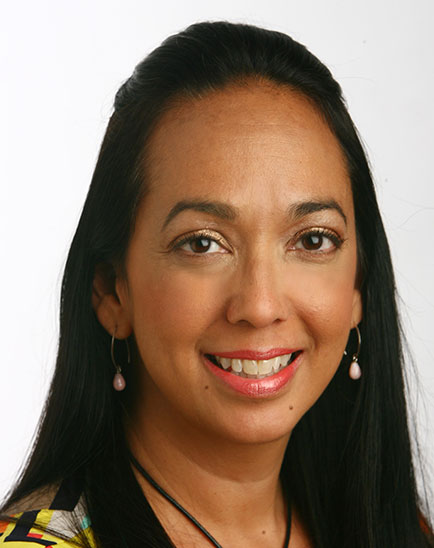 ” Frances Robles (pictured), a longtime anchor of our Latin America coverage, will join the International desk full time, focusing her journalistic authority and her penchant for digging on a region she knows very well,” New York Times editors announced July 19. “Known universally as Frenchie, she has already won ample acclaim for her work on International. She was the first to interview the first lady of Haiti after the president’s assassination, delivering a riveting deadline account of the killing that sent shockwaves around the world. The story was a central part of the team coverage that won a Polk Award and became a finalist for a Pulitzer Prize. Then, just this month, Frenchie won a prestigious Maria Moors Cabot Prize for her career covering the Western Hemisphere. . . .”
” Frances Robles (pictured), a longtime anchor of our Latin America coverage, will join the International desk full time, focusing her journalistic authority and her penchant for digging on a region she knows very well,” New York Times editors announced July 19. “Known universally as Frenchie, she has already won ample acclaim for her work on International. She was the first to interview the first lady of Haiti after the president’s assassination, delivering a riveting deadline account of the killing that sent shockwaves around the world. The story was a central part of the team coverage that won a Polk Award and became a finalist for a Pulitzer Prize. Then, just this month, Frenchie won a prestigious Maria Moors Cabot Prize for her career covering the Western Hemisphere. . . .”
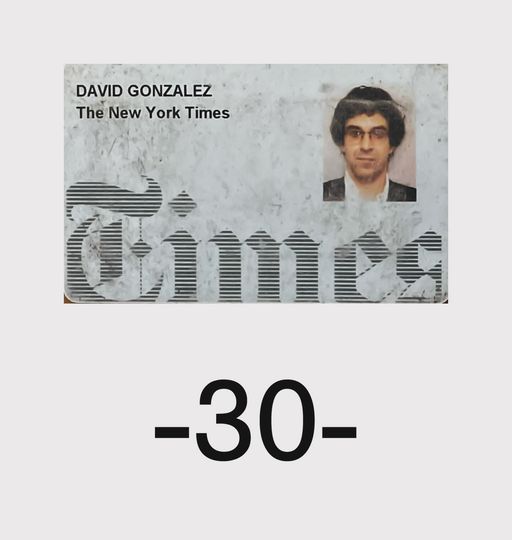
-
- The New York Times’ David Gonzalez announced Thursday that he has left the newspaper and is “overjoyed to do my personal work.” Gonzalez describes himself on his LinkedIn profile as, “Writer, photographer and editor with deep experience in print and multimedia locally, nationally and in Latin America and the Caribbean. From the 1980s South Bronx emerging from decades of abandonment and official neglect, through the social and political upheaval in Central America and the Caribbean at the beginning of the 21st Century, I have consistently provided nuanced coverage that deftly uses human, on-the-ground detail to illustrate not only the central issues being debated among politicians, scholars and policy-makers, but to also highlight innovative solutions.” His first Times byline appeared Sept. 15, 1990.
-
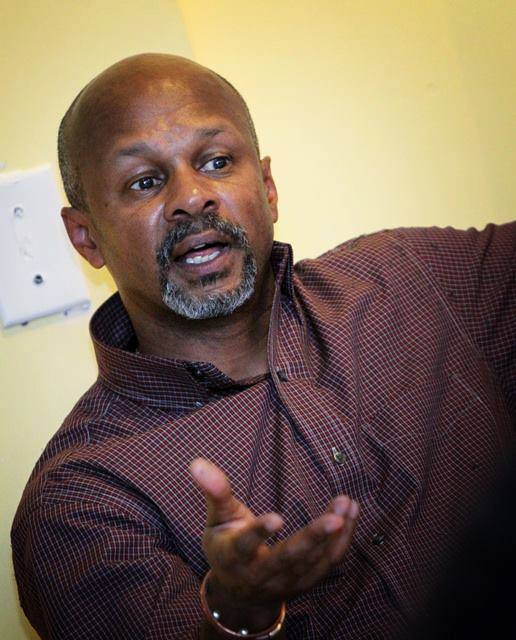 Dudley Brooks (pictured, by Sharon Farmer, 2014), deputy director of photography at The Washington Post, whose career includes stints at Johnson Publishing Co. as photo director and at the Baltimore Sun as assistant managing editor for photography, announced July 19 that he is stepping aside. “They say that the second time is a charm and I can truly vouch for that,” Brooks wrote on Facebook. “I’ve done two long stints at The Washington Post in different capacities and they’ve both been amazing experiences — as a photographer, editor, producer, mentor, influencer, manager, and deputy director. But I have other creative territories that I still need to explore and I want to concentrate my energy there now. Consequently, August 2nd is my last day at the WP. Been planning this for a while and it feels great to make it real.”
Dudley Brooks (pictured, by Sharon Farmer, 2014), deputy director of photography at The Washington Post, whose career includes stints at Johnson Publishing Co. as photo director and at the Baltimore Sun as assistant managing editor for photography, announced July 19 that he is stepping aside. “They say that the second time is a charm and I can truly vouch for that,” Brooks wrote on Facebook. “I’ve done two long stints at The Washington Post in different capacities and they’ve both been amazing experiences — as a photographer, editor, producer, mentor, influencer, manager, and deputy director. But I have other creative territories that I still need to explore and I want to concentrate my energy there now. Consequently, August 2nd is my last day at the WP. Been planning this for a while and it feels great to make it real.”
-
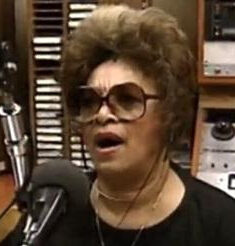 “Mary Mason (pictured), an iconic Philadelphia radio personality, died on Thursday at Penn Presbyterian Hospital in West Philadelphia,” James Jackson wrote Friday for the Philadelphia Tribune.”She was 94. Her death was confirmed by her former colleague, Thera Martin. Mason, whose real name was Beatrice Turner, had recently battled Alzheimer’s disease. ‘I’m sad to hear of the passing of the legendary Mary Mason, a pioneer for African-American women in Philadelphia radio,’ said Congressman Dwight Evans on Twitter/X. ‘It’s impossible to overstate her impact and influence.’ . . .”
“Mary Mason (pictured), an iconic Philadelphia radio personality, died on Thursday at Penn Presbyterian Hospital in West Philadelphia,” James Jackson wrote Friday for the Philadelphia Tribune.”She was 94. Her death was confirmed by her former colleague, Thera Martin. Mason, whose real name was Beatrice Turner, had recently battled Alzheimer’s disease. ‘I’m sad to hear of the passing of the legendary Mary Mason, a pioneer for African-American women in Philadelphia radio,’ said Congressman Dwight Evans on Twitter/X. ‘It’s impossible to overstate her impact and influence.’ . . .”
-
- “The Association of Independent Journalists and Communicators of Nicaragua (PCIN, for its acronym in Spanish) denounced the ‘disappearance’ of the journalist, Fabiola Tercero. At the same time, it expressed ‘deep concern and dismay’ at a new day of persecution against men and women of the press, during the last two weeks,” LatAm Journalism Review reported Wednesday, citing the publication Confidencial.
-
- “While press freedom challenges are not new in Ecuador, a surge of organized crime and drug-related violence starting last year has shattered journalists’ sense of security and increasingly put their safety at risk,” the International Press Institute said, introducing its recording of a webinar. “The government of President Daniel Noboa is under pressure to curb the violence, and has resorted to increasingly drastic measures to do so. But Noboa’s heavy hand is also raising fears about press freedom, including after the government reportedly pushed for the closure of a critical TV program. The upshot of these developments is a growing atmosphere of fear, self-censorship, and, increasingly, journalists leaving the country for exile. . . .”
-
- “The hearings in the case against elPeriódico newspaper founder Jose Rubén Zamora, scheduled [in Guatemala] for 22 and 23 July 2024, have been postponed again,” Reporters Without Borders said Wednesday. “This is the sixth time they have been postponed in recent months. Reporters Without Borders (RSF) calls on the government of President Bernardo Arévalo and Supreme Court chief justice Oscar Cruz Oliva to take a stand against this series of abusive maneuvers that are cruelly and unjustly prolonging the journalist’s pre-trial detention. . . .”
Thursday: ‘Press Freedom in Black-Run Countries’
Please click here for larger image of flier/poster
 The Journal-isms Roundtable will hold a panel discussion, “Press Freedom in Black-Run Countries,” in Chicago while the National Association of Black Journalists convention takes place in that city.
The Journal-isms Roundtable will hold a panel discussion, “Press Freedom in Black-Run Countries,” in Chicago while the National Association of Black Journalists convention takes place in that city.
The Roundtable will not officially be part of the convention; instead it will be hosted at the offices of Chicago Public Media on Thursday, Aug. 1, from 9 a.m. to 11 a.m. Central time. Chicago Public Media offices are on Navy Pier, at 848 East Grand Ave., Chicago, Ill., 60611.
The event is co-hosted by the NABJ Global Journalism Task Force. Those who are not in Chicago may join by Zoom. All are invited. To register for either in-person, Zoom or to watch on Facebook, please email blackruncountries (at) gmail.com.
After Black French journalist Olivier Dubois was held hostage last year for 711 days in Mali, West Africa, the press-freedom group Reporters Without Borders said, “To be a journalist in the Sahel means enduring the growing presence of radical armed groups who do not hesitate to kill reporters or kidnap them and use them as bargaining chips,” and more.
More recently, the rising authoritarianism around the world includes Africa as well as the United States. That most often means finding a way to tamp down, even silence, the press. Haiti’s existential crisis has been extensively reported, less so the state of journalism there and in the rest of the Caribbean.
Discussions about the African diaspora most often do not include press freedom, and journalism sessions in the U.S. about Black people often do not include a global view.
Panelists:
-
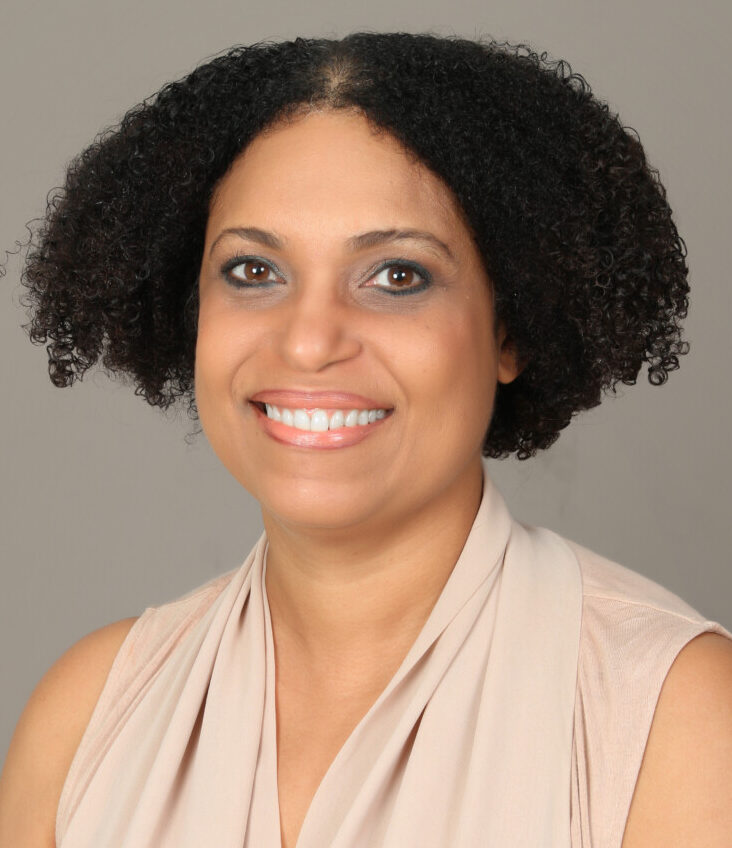 Zahra Burton, 18 Degrees North, Jamaica; Global Reporters for the Caribbean – founder and principal, Kingston, Jamaica
Zahra Burton, 18 Degrees North, Jamaica; Global Reporters for the Caribbean – founder and principal, Kingston, Jamaica
-
 Muthoki Mumo, Committee to Protect Journalists – Africa program coordinator, based in Nairobi, Kenya
Muthoki Mumo, Committee to Protect Journalists – Africa program coordinator, based in Nairobi, Kenya
-
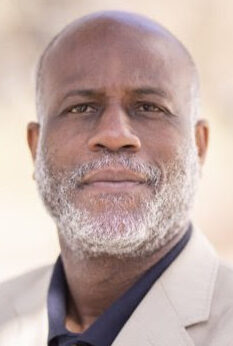 Garry Pierre-Pierre, Haitian Times – founder and publisher, Brooklyn, N.Y.
Garry Pierre-Pierre, Haitian Times – founder and publisher, Brooklyn, N.Y.
-
 Nompilo Simanje, International Press Institute — Africa advocacy and partnerships lead, Bulawayo, Zimbabwe
Nompilo Simanje, International Press Institute — Africa advocacy and partnerships lead, Bulawayo, Zimbabwe
-
 John Yearwood, Politico – editorial director – diversity and culture; formerly global chair of the Vienna, Austria-based International Press Institute and world editor of the Miami Herald
John Yearwood, Politico – editorial director – diversity and culture; formerly global chair of the Vienna, Austria-based International Press Institute and world editor of the Miami Herald
-
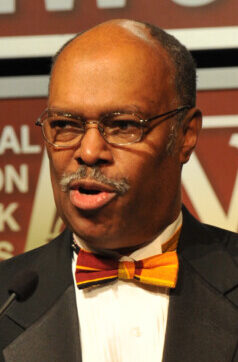 Richard Prince, Journal-isms columnist, moderator
Richard Prince, Journal-isms columnist, moderator
RSVP to < blackruncountries (at) gmail.com > whether or not you will be at the NABJ convention.
Update:
(Credit: Wallace House/YouTube)
Exiled Haitian journalist, NABJ honoree, joining Roundtable
Roberson Alphonse, this year’s recipient of the Percy Qoboza Award from the National Association of Black Journalists, has agreed to join the special Journal-isms Roundtable Aug. 1 in Chicago on “Press Freedom in Black-Run Countries.”
“I’m honored by your invitation to join that panel,” Alphonse messaged. Commitment to “ringing the bell on press freedom, democracy in this era of disinformation, populism and the rise of authoritarian regimes is priceless. We have to deal with those issues while our profession is facing [an] existential crisis. We are in surviving mode in Haiti. It’s almost the same for local press here in the US.”
NABJ said, “This award recognizes a foreign journalist who has done extraordinary work while overcoming tremendous obstacles that contribute to the enrichment, understanding, or advancement of people or issues in the African Diaspora.
“Alphonse, one of Haiti’s most respected investigative journalists, is not only a fearless journalist but a brave soul. He survived a shooting attack in 2022 that left him wounded in both arms on his way to work at a Port-au-Prince radio station. Now a University of Michigan Knight-Wallace Fellow, he boldly continues to heal and continues his work as the News Editor for Le Nouvelliste and Information Director at Magik9.”
—
You can see a video detailing Alphonse’s story and journey to Wallace House here.
- David C. Adams, Committee to Protect Journalists: Haitian press face ‘existential crisis’ with no end to gang violence
- Abubakar Mohamed Ali, Radio Dalsan, Somalia: Outrage Over Somali Journalist’s Arrest Sparks Concerns for Press Freedom
- Committee to Protect Journalists: Somali police arrest journalist AliNur Salaad on ‘false reporting’ allegations
- Anton Harber, Daily Maverick, South Africa: Press Council case against Independent Media will have implications for all opinion writers
- Ed Holt, Inter Press Service: Rights Groups Demand Governments Protect Exiled Journalists, Dissidents
- International Federation of Journalists: Kenya: [Federation of African Journalists] Strongly Condemns Assaults on Kenyan Journalists, Calls for Immediate Action
Previously:
-
- Ajabu Adolphe, New Humanitarian: How Congolese journalists covering the M23 war are being forced to pick sides
-
- Committee to Protect Journalists: Three journalists disappear, 3 media outlets suspended in Burkina Faso
-
- Committee to Protect Journalists: Malian journalist Yeri Bocoum missing after covering banned protest (June 27)
-
- Global Press Journal: ‘Unwilling to Stop’: What it Takes to Be a Local Reporter in Haiti
-
- Mark Heywood, Daily Maverick, South Africa: The defence of journalism and journalists is a social justice issue (June 30)
-
- International Federation of Journalists: Kenya: Journalists attacked by police during protest in Nairobi
-
- Media Foundation for West Africa: Ghana’s ruling party’s thugs invade radio station, attack rival faction communicator (June 17)
-
- Media Foundation for West Africa: Liberia Stands at Crossroads: CEMESP [Center for Media Studies and Peacebuilding] issues call to action on World Press Freedom Day (May 6)
-
- Premium Times and Agency Report, Lagos, Nigeria: Nigerian govt threatens to jail whistleblowers who leak govt documents
-
- Radio Amazuj: Sudanese journalist released after detention in Shendi
-
- Reporters Without Borders: More than 70 obstacles to reporters’ work in three years: journalism at a crossroads in Senegal (June 6)
To subscribe at no cost, please send an email to journal-isms+subscribe@groups.io and say who you are.
Facebook users: “Like” “Richard Prince’s Journal-isms” on Facebook.
Follow Richard Prince on Twitter @princeeditor
Richard Prince’s Journal-isms originates from Washington. It began in print before most of us knew what the internet was, and it would like to be referred to as a “column.” Any views expressed in the column are those of the person or organization quoted and not those of any other entity. Send tips, comments and concerns to Richard Prince at journal-isms+owner@
View previous columns (after Feb. 13, 2016).
View previous columns (before Feb. 13, 2016)
- Diversity’s Greatest Hits, 2018 (Jan. 4, 2019)
- Book Notes: Is Taking a Knee Really All That? (Dec. 20, 2018)
- Book Notes: Challenging ’45’ and Proudly Telling the Story (Dec. 18, 2018)
- Book Notes: Get Down With the Legends! (Dec. 11, 2018)
- Journalist Richard Prince w/Joe Madison (Sirius XM, April 18, 2018) (podcast)
- Richard Prince (journalist) (Wikipedia entry)
- February 2018 Podcast: Richard “Dick” Prince on the need for newsroom diversity (Gabriel Greschler, Student Press Law Center, Feb. 26, 2018)
- An advocate for diversity in the media is still pressing for representation, (Courtland Milloy, Washington Post, Nov. 28, 2017)
- Morgan Global Journalism Review: Journal-isms Journeys On (Aug. 31, 2017)
- Journal-isms’ Richard Prince Wants Your Ideas (FishbowlDC, Feb. 26, 2016)
- Richard Prince with Charlayne Hunter-Gault, “PBS NewsHour,” “What stagnant diversity means for America’s newsrooms” (Dec. 15, 2015)
- Book Notes: Journalists Follow Their Passions
- Book Notes: Journalists Who Rocked Their World
- Book Notes: Hands Up! Read This!
- Book Notes: New Cosby Bio Looks Like a Best-Seller
- Journo-diversity advocate turns attention to Ezra Klein project (Erik Wemple, Washington Post, March 5, 2014)
-
- Joey Cappelletti, Associated Press: Harris quickly pivots to convincing Arab American voters of her leadership
![]()

